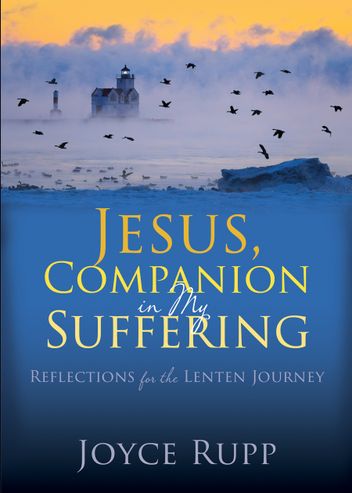
(Pixabay/Jeff Jacobs)
Bestselling author and international retreat leader Joyce Rupp thinks she may finally have Lent figured out.

It's not a focus on her sinfulness that elicits inner change, she has found, but rather a re-centering on the goodness that is already present. This assurance of the Spirit living and active within her has proven to be an anchor of hope in times of trial, a truth Rupp seeks to impart to readers in her new book Jesus, Companion in My Suffering.
Rupp spoke to NCR about her hopes for the book's readers, as well as for the church, this Lenten season. The following conversation has been edited for clarity and length.
NCR: Jesus, Companion in My Suffering is a Lenten book for folks who are carrying heavy burdens of one kind or another. Who did you have in mind as you were writing this book? What did you imagine the reader needing to hear?

Bestselling author, international retreat leader and conference speaker Joyce Rupp (Alexander Photos)
Rupp: Everyone knows what it's like to hurt, to have sorrows, concerns and worries. Some of these are not necessarily overwhelming burdens, but they still take a toll on our sense of peace. People suffer from many things that steal joy and hope from them, such as needling regrets and traumatic memories, ongoing depression, feelings of inadequacy, attempts to overcome an addiction or the ongoing weariness of compassion fatigue.
It's vital that we tend to what hurts in us. I hope readers will hear that they are not alone in what they experience, that they'll find encouragement and inspiration to face what seems daunting for them or their loved ones.
The daily reflections in this book are short, designed to be read in just minutes. Why did you choose this format? Was it difficult to be so concise with your language?
The other day I was driving on the freeway and thought, "Why is everybody driving like there’s no tomorrow?" Then I realized I, too, was driving over the speed limit. More than ever before, events and experiences of our society press upon our minds and hearts, easily distracting and pushing us to believe there's never enough time for everything and everyone.
I want to respect how people are feeling and what their needs might be. A six-line prayer and two short paragraphs with a focus that connects closely to their lives, and to the life and teachings of Jesus, can offer plenty of spiritual nourishment. I admit that it takes quite a bit of editing to do this. It's kind of like boiling down maple syrup until it consists of a welcoming thickness. I'm a poet at heart and this is what I love about poetry; so much can be related in a few, meaningful lines.
You have obviously mined the depths of spirituality for many years. How do you continue to approach Lent with fresh eyes over and over again? What advice would you give someone who might be feeling dry and stale inside as Lent begins?
I recently read a quote from the wonderful author John Shea. He comments that "Only when we are quiet can we touch the depth of our feelings and thoughts and bring them forward adequately." If I, or anyone else, meets Lent with fresh eyes, we will have to pause and take inventory of "what’s going on" both inside and outside of ourselves. Sit long enough and we will find the answer to what could use some sprucing up or require a more intentional focus.
Quite frankly, I'm tired of being reminded at the opening of every Eucharistic liturgy that I am sinful. That's a given. What I, and others in the pews, really need to be reminded of is how much goodness (God-ness) there is in us, our potential to be superb human beings. This motivation is much more effective for making a change. So I focus on the fruits of the Spirit and their potential to be deepened and strengthened in my life. This wakes up any dryness or apathy I might be feeling and brings in a breath of possibility to become my truest self more fully.
Do you have any specific Lenten habits or rituals that have proven effective for you? Or are there any new practices you plan on embracing this year for Lent?
I've already done some reflecting on what's stirring in my life and how I might best tend to it. I think the three aspects of Lent that the church suggests are viable ones —prayer, fasting and almsgiving. Each can be a catalyst for renewal. That last one of almsgiving keeps me from being too self-oriented in my Lenten practice.
Last year I focused on doing a deed of kindness each day. My almsgiving was not financial, but the gift of something tougher for me: sharing my precious time with persons who might benefit from my presence and care. Phone calls, email messages, personal visits, sending cards, etc. This year I have a totally different focus. I sense a need to stretch more toward marginalized people. I am going to read Howard Thurman's Jesus and the Disinherited for my inspiration and find a local organization where I can volunteer my assistance.
Advertisement
NCR: You have a signature technique in writing prayers, in that you address God in nontraditional and creative ways ("Unexpected Visitor," "Consoling Caregiver," "Protector of the Wounded"). How do these unique names for God come to you? What is the benefit of experimenting with our spiritual language?
Rupp: When I'm reflecting on a Scripture text or creating a prayer, I look and listen for what quality of divine presence might be inherent within it. This inventive name for divinity awakens and freshens the relationship, widens and strengthens it, drawing me closer, much like giving a special nickname to a dear friend or a spouse.
Decades ago I finally moved beyond my belief that only the names designated by the hierarchical church could be used when addressing or speaking about this divine presence. I still get verbally bruised once in awhile by certain church voices when I address divine wisdom as Sophia (the Greek word for wisdom") but I find readers usually relish these creative names.
NCR: If you could hope for any conversion for the church at large this Lent, what would it be?
Rupp: Oh my, that's a big question. My central hope for conversion on a church-level rests on what I believe Pope Francis has been conveying in his teachings: that each and all of us, particularly ordained clergy, ought to have a true respect for one another, that we would seek the commonalities in our humanity instead of aligning ourselves on a spiritual ladder that sees some as better than others, and to value the wisdom from lived experience present in each person.
If only we could welcome one another rather than focusing on what divides us, whether that be creeds, gender or political views. Conversion is about change, and this conversion would be a huge one. I believe we are all capable of having it happen. The Respectful One's grace abounds, but we need to receive and activate that precious gift.




